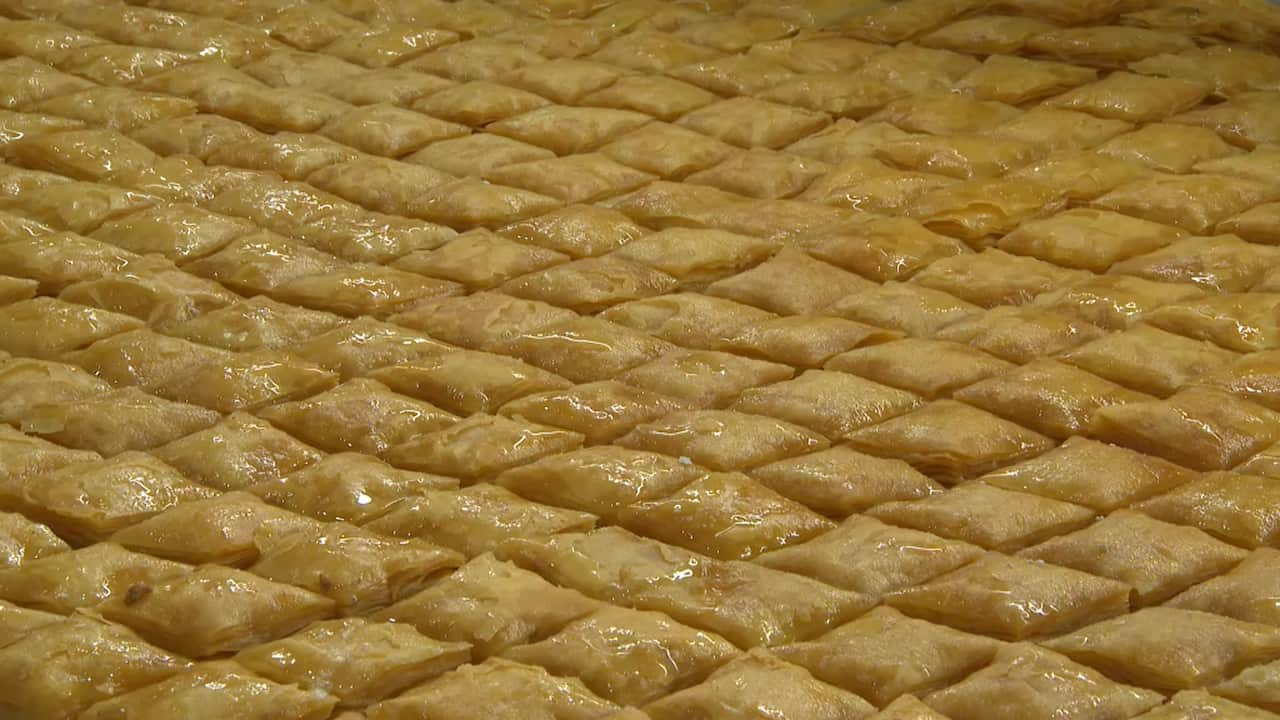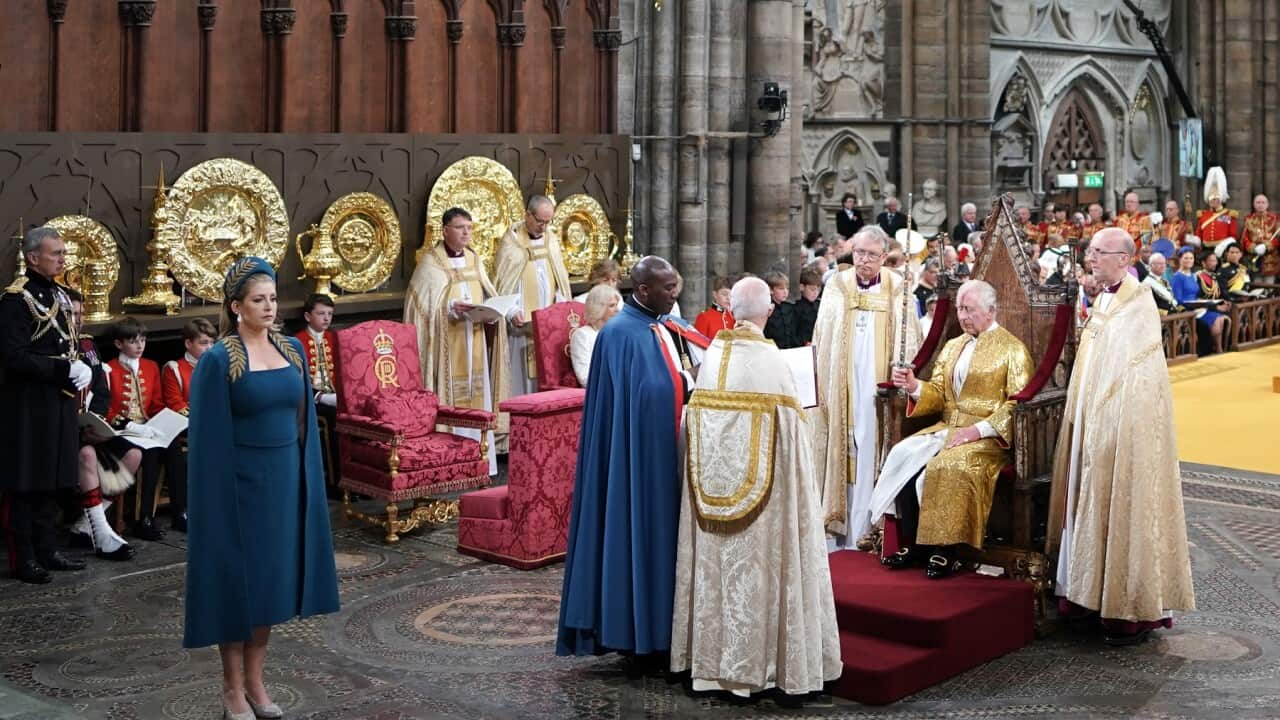While many Australians who celebrate Christmas do so with a BBQ or roast Turkey, for some migrant communities, there's one particularly sweet dish on the menu.
Baklava - a filo pastry dessert made with chopped nuts and syrup or honey - has managed to cross the religious and cultural divide.
It is consumed by Christians, Jews and Muslims alike.
Ljubica Popovski was born in the Former Yugoslav Republic of Macedonia and together with her family runs the Balkan Oven Cafe in Sydney.
Her sons are rolling out thin layers of pastry for borek, another regional specialty, while Ms Popovski is at the other end of the kitchen preparing a tray of baklava. Ms Popovski came to Australia more than 30 years ago with her recipe adapted from one she was taught in a Macedonian high school. She serves up the European version using multiple layers of filo, interspersed with a sprinkling of walnuts, breadcrumbs and oil before finally pouring over sugar syrup.
Ms Popovski came to Australia more than 30 years ago with her recipe adapted from one she was taught in a Macedonian high school. She serves up the European version using multiple layers of filo, interspersed with a sprinkling of walnuts, breadcrumbs and oil before finally pouring over sugar syrup.

Ljubica Popovski Balkan Oven Cafe - SBS Source: SBS News
From Egypt to Cyprus
Athanasi Efthimiou runs the Trianon Cake Shop in Earlwood, in Sydney's Inner West.
Greek-Cypriot in origin, his baklava recipe includes ground almonds and cinnamon.
His family ran a shop of the same name in Cyprus until 1974 when political unrest caused the family to leave. They fled to Australia as refugees where the sweet-making tradition continued, with Mr Efthimiou and his brother taking over the business. His father learned to make their version of baklava in Egypt before returning to Cyprus and adapting it to local tastes.
His father learned to make their version of baklava in Egypt before returning to Cyprus and adapting it to local tastes.

Trianon Cake Shop 1970s Source: Supplied
"We do two layers of filo, oil, two layers, oil again, up to six to eight layers on the bottom. We grind up almond and we mix it through with some cinnamon and put it through and then we put some filo again pastry with layers: filo pastry again with vegetable oil."
Who owns the recipe?
There is no consensus about the origins of baklava but Esen Birben, from the Menzil Turkish Bakery, claimed its birthplace is clear.
"Turkish. Turkey! It's from Antep which is part of Gazientep which is very famous for doing baklava."
Ms Popovski agreed: "from Turkey". But Mr Efthimiou said he isn't so sure.
"That's a pretty divisive question because people say it's Turkish, Greek, Egyptian, Middle Eastern. They all have a variation on the baklava so ... I don't know where it originally came from. I don't know!
Nick Doumanis is an Associate Professor of History at the University of New South Wales, specialising in the histories of Europe and the Mediterranean.
He said there are some unsubstantiated claims that baklava dated back to the ancient Assyrians, but he said there is no reason to dismiss the possibility that something like baklava existed even before them. Another theory is that it spread from either Turkic or Mongol peoples who liked to roll thin layers of dough and pile them up.
Another theory is that it spread from either Turkic or Mongol peoples who liked to roll thin layers of dough and pile them up.

From front Turkish, (left) Greek, (back) Lebanese, Source: SBS
Even the origins of the name are ambiguous.
"Of course all these nationalities around the Mediterranean through to Persia claim it as their own. We can never really know who owns it, and nobody does own it really," Professor Doumanis said.
A number of countries serve up their own version. They include - but are not limited to - Syria, Lebanon, Iraq, Jordan, Algeria, Macedonia, Greece, Serbia, Israel, Cyprus, Iran, Armenia, Egypt and Turkey.
The Ottoman Empire
It is believed the Ottoman Empire, which for centuries ruled large parts of the Middle East and Europe, played a major role in its spread, Professor Doumanis explained.
“The Ottoman Empire is very important because at its height in the 16th century it stretched from Algeria right through to the Persian border and right up into central Europe. And in nearly every part of that massive empire baklava was adopted, and in each part of that empire different variations of baklava was produced and often reflected what you could find in that area.”
Taha Gunduz runs Menzil Turkish bakery in Auburn, a Sydney suburb with a large Turkish-Australian population.
Mr Gunduz said he's fascinated by the history of the sweet and what it symbolises.
"You have a lot of people who compete for ownership for where it comes from and where it originates from. But I think something that is quite interesting is at some point, the people and the cultures must have crossed over if they have adopted the same food, so I think it's a positive at the end of the day. I think that's a nice thing."
Abla's, a Lebanese cake shop in south-west Sydney, makes massive trays all year round, favouring pistachio and cashew nuts in their mix. Charlie Abla said there's a long tradition of sweet making in his parents' homeland.
Charlie Abla said there's a long tradition of sweet making in his parents' homeland.

Lebanse baklava Ablas Sydney Source: SBS News
"In Lebanon there are stores that have been open for 200 years, and those stores that have been opened there go from generation to generation to generation. In the sweets, it's a history, it is like a trade."
Professor Doumanis believes beyond just being a form of sustenance or enjoyment, food also helps create a sense of personal history, connection and place.
"Recently a Canadian-Jordanian wrote a book which had baklava in the title. Clearly baklava means to a lot to these cultures, it means who you are. You associate it with your upbringing and your culture."
And on the vexed question of which country makes the best baklava - Charlie Abla believes the answer is ... Australia.
"Everything here is so rich and fresh, our flour is better ... I believe the fresher the ingredients, the better the ingredients, the better the taste."




